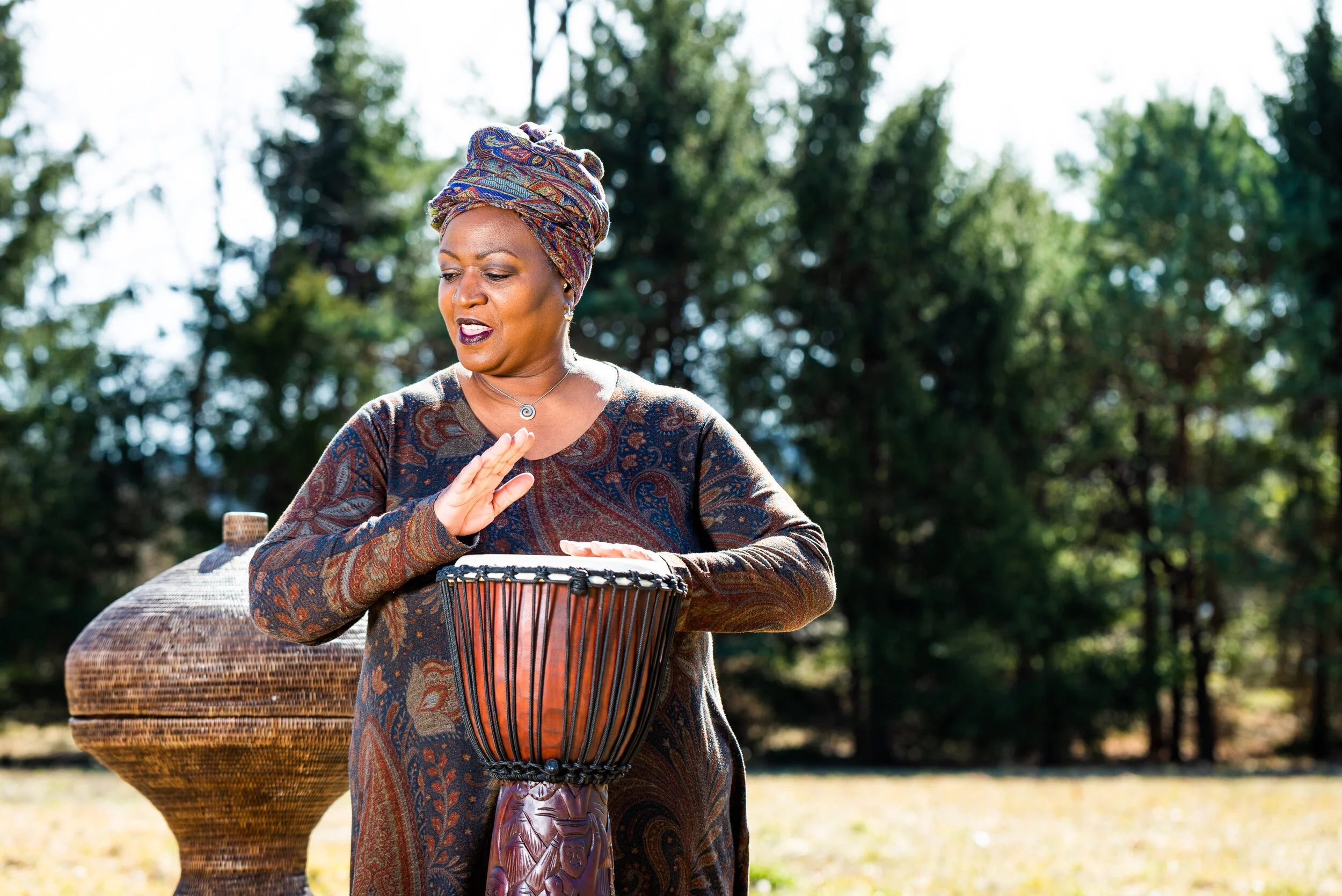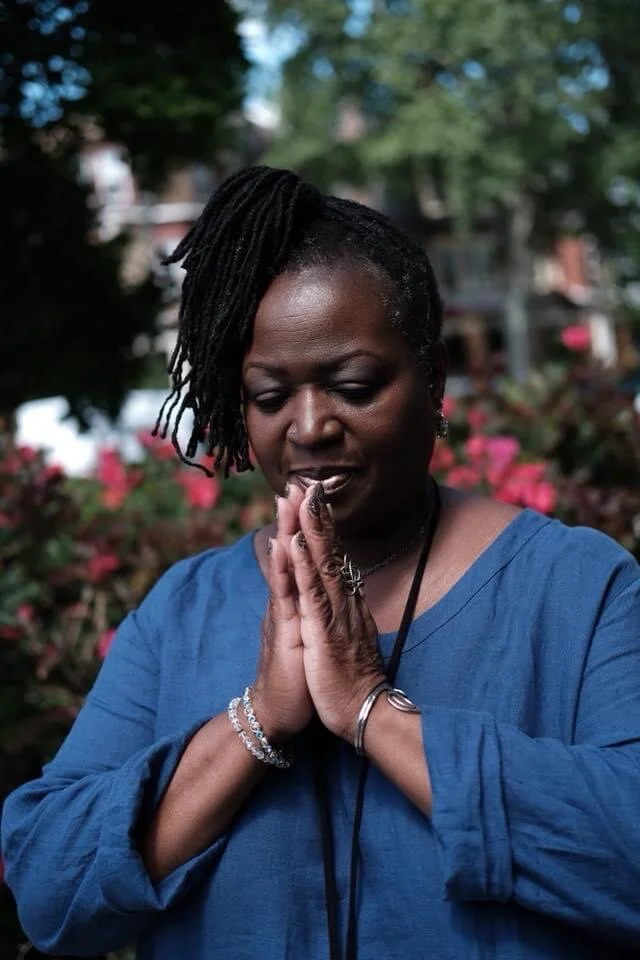Rhetta Morgan: Find your deepest truth and sing it
This post is part of a Grief Care series, featuring BIPOC healers across multiple traditions and modalities. Each week will spotlight a different healer, sharing their work, how they’re meeting these deeply challenging times, the grief they’re carrying and how they’re tending to it, and what it means to hold space for their communities at the intersections of healing and justice.
Today, I talk with Philadelphia area singing healer Rhetta Morgan, also the founder of Ecclesia Voicing.
Photo by Chris Baker Evens
“There are many kinds of music, all have mourning songs. Find songs that speak to your heart, let them help work the loss through.” - Rhetta Morgan
The last few months have been a time of such profound grief on many levels for our country: what are the griefs you’re sitting with right now?
I am grieving for the loss of touch. For people who are the most vulnerable and struggling. For the loss of our country’s facade of decorum.
Grief is something we tend to run away from or rush through in this culture: how do you stay present to it and not turn away from the hard and uncomfortable?
It is the breath that allows me to stay with what is most difficult to endure. Breathing with and breathing through sorrow, pain, loss gives me another place to put my attention. It is almost as though I watch my pain from a compassionate and expansive place. It changes the texture or the way the pain feels. It is less sharp. Sound, humming, moaning, wailing, singing support the breath as well.
One of the things you navigate so well is that dance of holding heartache and keeping your heart open or allowing a deeper opening: how do you sustain such a practice?
Experience has taught me that grieving, like happiness, comes in waves. If I can remember that sorrow won’t last forever, I can relax into it, be curious about it. During the hardest times I built a relationship to it, with it. Singing, movement, poetry made it possible to be with grief and not be overwhelmed by it. By bringing my compassionate heart to my broken places, spiritual alchemy happened. It’s hard to put into words, but I had the sense that no matter how much pain I was in, I would be alright.
In what ways does this nurture and fuel you?
I don’t have to move in the world plagued by fear of grief. I get to see the world as having many facets. Grieving is one very important part of the cycle of a full, whole life.
What, if any, medicine is there for you in grieving, in noticing and tending the sorrows of your heart and the world?
I have found that as grieving wanes I have been changed. I feel stronger in some very subtle ways. I feel a bit clearer and often more grounded. As we learn to grieve in community, we will add depth, texture and dimension to our relationships, to our ability to be with the uncomfortable. Expressing our grief may also add richness to our capacity for joy.
You are so many things: an interfaith minister, a spiritual activist, a professional singer, the founder of a project to support families of the incarcerated…yet one of the things that has been inspiring and supporting so many during this time is your work as a singing healer. What does being a singing healer encompass for you?
I have come to believe that all the work I do belongs under this banner. As I settle into elderhood, it has become important to streamline the range of projects I am engaged in. I am called to focus on the center of my purpose. The relationship of voice to healing and empowerment is my first love. I am including all the ways we express as the voice of our collective spirit. I believe in the impact of sound, of music and art to infuse what we are doing with power that moves us forward.
If our activism comes out of our heart healing, we can perceive a broader scope of what is possible. We can move from our sense of oneness and connectedness rather than from our anger and otherness. Anger is powerful and important, but not always that which inspires expansiveness. We need places for all our parts and better understanding of how the parts can work together to inform the dismantling and rebuilding of systems that seem insurmountable. We also need everyone standing powerfully in their own gifts bringing their healed or healing perspectives. Singing and healing are who I am and what I bring.
How did you come to this passion and vocation?
Life. I have chosen to heal as my primary focus in this lifetime. Healing is my passion.
In what ways have sound and music been a healer in your own life?
As a youngster, singing comforted me as I tried to navigate stormy surroundings. As I matured, it was my work as well as my comfort.
How do they help you to hold and process your grief?
There are songs that cause or support tears to come. That talk about loss, struggle, trouble, songs that resonate deeply with the emotional body. Feeling deeply, rocking, humming moves the heavy emotions through the body. It is very important not to let those emotions get stuck.
What does it look like to offer this healing to others? (How can people access the benefits?)
Singing together, moving together. Sharing our stories. I think we should begin to write memorials for all the different losses we are processing. We can have personal ceremonies, or small groups, Zoom ceremonies, outdoor gatherings to sing and cry.
Your work incorporates vocal intonations, mantras, poetry and songs that uplift the human spirit: is your creative process centered on an intention for healing?
Yes, I start with an intention to be an instrument for the process that is wanting to happen. I seldom name a particular outcome as intention. I trust the Universe to know what aspect of healing is available, ready to happen in the current moment.
People have always turned to music for solace and companioning through life’s difficult passages, but for someone who is grieving, in what ways can your work be of deeper and more intentional support?
Mainly, to be accompanied or witnessed during the hardest moments can be cathartic. I count it an honor to be able to sit with, sing, plan a grieving ritual or ceremony with someone processing loss.
I’m thinking of your song “We Belong to Each Other,” where you encourage us to “go on and cry your eyes out until the tears clear away…”: do you believe there’s an alchemy in our tears?
Absolutely! Tears can be as cleansing as a good shower. In fact, the idea of water washing away what is no longer needed perfectly describes how tears are essential to grief being transformative.
Do you have a personal philosophy or mantra you embody as a singing healer?
I extend my voice, tuned to the vibration of healing, into the continuous now. All within the sound of my voice are healed. I will keep singing till there is liberation, justice, wholeness for everyone.
As a black woman, what feels most vital to you about this work, especially at the intersection of turbulence and transformation where we find ourselves?
I envision the intersection of turbulence and transformation as a kind of eye of the storm. The place where there is a spiritual invitation to cultivate prayer, meditation, chanting so that we move through our lives buzzing with love, compassion and a willingness to contribute as we are called.
Being black in this country inevitably means carrying grief in the body yet we don’t have equal access to time and spaces that support caring for our grief. What suggestions do you have for grief care practices we can weave into our daily lives?
I would suggest movement — dancing, rocking, swaying. Simple practices such as placing your hand over your heart and taking a deep breath can be helpful. Singing along with songs that move through struggle into hope and encouragement is also a good practice.
What words of wisdom or song would you offer to anyone holding a grieving heart right now?
Listen to the songs that move you. There are many kinds of music, all have mourning songs. Find songs that speak to your heart, let them help work the loss through. This is an extraordinary time. Cultivate a relationship to something, a spiritual tradition, a way of thinking that will ground you in eternal, universal truths. I believe in love. I believe love is inviting us to evolve. Cultivating this gives me a place to anchor, to keep coming back to. It is a reference point, an inspiration and encouragement. Find the deepest truth you can and live it, sing it with all you’ve got!
BIO
Photo by Christian Hayden
Rhetta Morgan has been gathering tools for healing and inspiration over a lifetime. Whether singing, praying, facilitating or sermonizing, the Rev passionately encourages spiritual practices such as cultivating hope and proclaims connection as a pathway back to a sense of enough-ness. Rhetta is the founder of Ecclesia Voicing, the evolution of Ecclesia Spiritual Center, which offered innovative spiritual gatherings for over a decade. Ecclesia Voicing may be the first of its kind, a community bringing together interfaith spiritual teachings with vocal expression. She offers the groundbreaking Inner Voice Process, which is a spiritual approach to vocal training, along with a host of circles, workshops and gatherings focused on a range of healing themes. She is a sought-after guest speaker and singer on Zoom currently. Other kinds of work include:
Facilitator for the Anti Defamation League
Creator and facilitator of “Bless the Night” and “Ground, Heal, Ignite,” both workshops presented at Pendle Hill Quaker Retreat and Conference Center
The Power of Love, day-long retreat designed for the Center for Contemporary Mysticism
Re-Unioning, A Spiritual Practice for Our Time, a conversational program, Center for Contemporary Mysticism
Guest faculty member at the School of Sacred Ministries, Pebble Hill Interfaith Church
Co-facilitator for the Unitarian Universalist 18-month continuing education program for ministers, Beyond the Call
Featured in the movie, “Grounded While Walls Fall,” directed and produced by Zein Nakhoda.
She encourages and supports us to be in open-hearted relationship with our highest wisdom and expression as well as being in relationship to all the parts we have struggled with or been challenged by. This work of bringing our whole selves to joyful expression contributes to internal, communal and global healing, helping us envision liberation and feel into the futures we are wanting to build. Rev. Rhetta can be contacted at Reverendrhetta@gmail.com or on Facebook and will be launching a website listing events and services soon.




